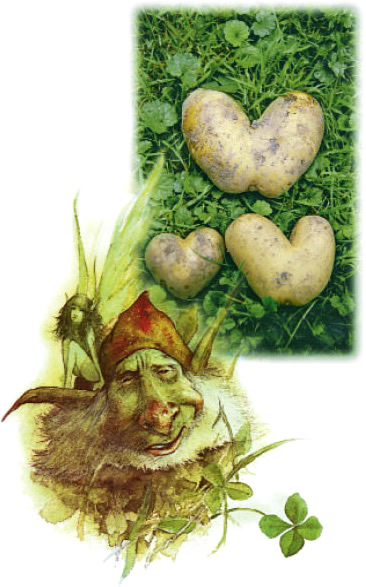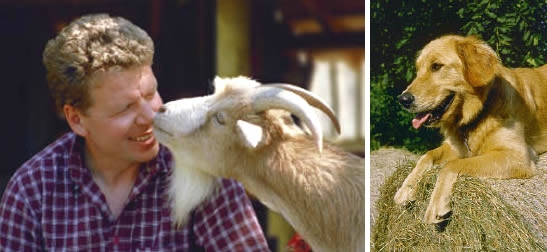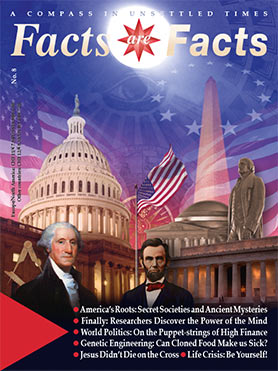"Love of Nature creates true wealth"
A farmer tells us about his life and work, where Angels also have their place alongside the meadows and wild birds.

Gottfried Halter calls the Nature Spirits his ‘co-workers’, and Nature visibly thanks him.
Despite this, being a farmer is no longer an appealing job—and hasn’t been for quite a while. Day after day we toil from dawn till dusk; a day off is a rarity, let alone one or two weeks’ holiday a year. We are at the mercy of the elements and battle constantly against Nature, which threatens our harvests with pests, viruses and all sorts of diseases. Worry wears us down, because our farms are in fact too small to be profitable. Neither can we purchase the neighbouring farm, even though there is no one to inherit it—because ten other farmers, also fighting to survive, are vying with each other for the land and cattle. Prices for milk, meat, crops, etc. are so low that it is practically impossible to live off them. Added to this, new laws and rules in animal protection, water pollution control and environmental conservation restrict our business strategies and actions. And last but not least, we count ourselves lucky if, as men, we ever find a wife who actually wants to share this arduous life with us.
The Farmer’s Endless Struggle
Such thoughts plagued me when in the 1980s I left agricultural school as a trained farmer, diploma in hand. Back then I was extremely determined not to go into farming and first pursued another occupation for a couple of years. I saw no future for myself and the farm, which at some point I was to take over from my father.
At agricultural school, of course, we were taught all the ins and outs of farming. I knew all the important diseases that could afflict our working animals, and how to deal with them. The duration of antibiotic treatments was just as familiar to me as the food that increases animal productivity. In crop farming I learned about many a pest, virus, fungus and weed, whose names I had never heard before; I was taught how to fight them and what chemical treatments were necessary. In addition, I had precise fertilisation plans to get the maximum yield from the plants.
But one thing was barely touched upon, if at all: the whys and wherefores. Why do we have diseases and pests? Why do they appear? Why does a milk cow barely reach the age of ten these days, when she could easily reach the grand old age of twenty? Why do we have potato varieties that are unable to survive without being chemically treated with copper? Why are more and more people developing allergies to our agricultural products (milk and wheat)?
These questions will remain unanswered for as long as we keep focusing only on the symptoms—the illnesses—and don’t look for their causes. We view Nature from a purely economic perspective, as if it were simply a machine that must produce what we expect from it. But Nature is anything but a machine; it is so much more than that—but this only became clear to me later.
In 1989 I nevertheless took over the farm from my father, whose advancing age obliged him to slow down a little. Initially, I tried to manage the farm as I had learned at college, but after three years I decided to try something different and switched to organic farming. I was one of the first organic farmers in our community, and not everyone approved of my approach.
For the first two years I strictly followed the guidelines of organic farming. Like conventional agriculturists, organic farmers also battle diseases and pests—but by applying natural methods instead of brutal chemical treatments. Even so, it is essentially the same attitude and response towards Nature as our conventional colleagues. It is impossible to solve problems in Nature by fighting the symptoms alone; we simply shift them from one year to the next.
Thus after two years I gave up this futile battle and decided to try out completely different ways of working with Nature. It was the start of a great adventure that I am still enjoying today.
The Value of the ‘Useless’
The first few years without using any battle tactics were extremely hard. We were pretty much unable to harvest any cherries on our farm, since the trees had been harmed by aphids in such a way that the fruit just couldn’t ripen. Nature was mercilessly showing us just how far she had fallen out of balance. There was nothing else for it but to look for the causes of this imbalance, in particular with the cherry trees.
Simply put, it came about because we view Nature exclusively from a business perspective: anything of obvious use or value is exploited while anything that seems to be ‘useless’ is removed—hedges, marshlands, tall trees, for example. In Nature, however, nothing is ‘useless’; otherwise she would long ago have eliminated such things. So I began to plant hedges that are habitats for many species of birds, hedgehogs and other small animals. As a result of some extensive management, certain areas in rough pastures were transformed and are now home to lots of rare plants. I also planted tall fruit trees near the hedges and meadows in order to bind the different elements to each other.
It is amazing how quickly Nature reacted to these changes. Within just a few years the aphid infestation on my cherry trees fell to such an extent that it presents no further problem. Today we are able to harvest lovely cherries without needing to apply any control measures.
This experience only spurred me on and I thought: “If it worked with the cherries, then it can also work with potatoes, vegetables or even animals!” Slowly I realised that, as a farmer, it wasn’t about fightingNature; rather it was much more about collaboratingwith everything that lives and prospers in Nature. Thus birds have become one of my most important allies—insects being a main food source, the birds keep their numbers in check and thus prevent them from becoming pests.

Billy goat Köbeli kisses his lord and master on the nose. Farm dog Jessica would rather give Gottfried Halter a sloppy kiss and waits longingly for her turn.
Unfortunately there are also plenty of examples in which Man has defaced Nature for selfish reasons. Today we breed cows that produce more than 10,000 kilos of milk per year—more than double what a cow would produce under natural circumstances. Most of these high-yield cows only reach the age of about eight to ten years, since their bodies are so fully spent and drained. Often such animals incur high veterinary costs because they have fallen into a disharmonic condition and are susceptible to all sorts of illnesses as a result of such one-sided overbreeding. It goes without saying that the milk quality of these animals is obviously reduced—it is probable that the growing number of milk allergies in children and adults could also be linked to this.
A particularly stark example of profit-oriented mis-breeding is the featherless hen—simply so that it no longer has to be plucked in the slaughterhouse.
Thousands of Collaborators
“Replenish the Earth and subdue it,” says the Old Testament. And this is how we justify the slavery and bondage of Nature. Especially as a farmer I simply cannot share this view: my farm with all its creatures—from cow to bird and insect to plant—was only put under my care for a certain time. At some point I will pass the farm to other hands, just as I received it from my father’s.
For me, all farm inhabitants are my ‘subjects’ or ‘co-workers’, as I like to call them. They give me and my family the foundation for life. Furthermore, they also take care of my spiritual well-being by filling the air with birdsong and the sound of babbling brooks and I can refresh myself in the beauty and scent of the many flowers, or in the cool shade of a tree.
As head of the farm, I am responsible for all these beings. Some of the trees are much, much older than I am, yet they are my subordinates; subjects, even. This doesn’t mean, however, that I have the right to impede, oppress or torment any one of these beings in any way in its natural development.
Yes, I decide whether or not to fell a tree, which plants grow on my field and which are rather unwanted in a certain place. I also decide whether and when an animal on my farm is slaughtered. I am the head of my farm and have the authority to make decisions, but I also bear the responsibility for these choices.
It’s not always easy. Take Deborah, for example. One day this cow no longer wanted to eat. There was no visible injury on her; she was in other respects a healthy, robust cow. Yet she would simply stand there while all the other cows greedily gobbled their morning ration of fresh grass. When after one day she still wasn’t eating, I called the vet. As he examined Deborah‘s abdominal area, she immediately reacted with a jerk; she was obviously in a lot of pain. The vet thought the cow probably had a foreign body in her tummy, some kind of sharp object like a shard of glass or small nail, which she had eaten along with her food.
This can happen, as cows are ruminants. They eat lots of raw food hastily without chewing much. It is only later, during rumination, that cows regurgitate their food and chew it properly. A sharp object gobbled down had probably so severely injured the stomach wall that it had become inflamed, explained the vet. Any attempt to eat would subsequently cause the cow a lot of pain.
It was now up to me to decide what to do with this animal. As the sharp object could not be removed from the stomach wall, sooner or later Deborah would die from the injury. I therefore decided to release the cow from her suffering as quickly as possible and she was taken for slaughter at the nearest slaughterhouse.
A subsequent examination of the stomach revealed that there was indeed a four-centimetre nail in her stomach wall, which had already become severely inflamed. Indeed, some more indigestible objects even emerged: a few small pieces of metal and a broken nail file—carelessly thrown away by someone and eaten by my cow.






